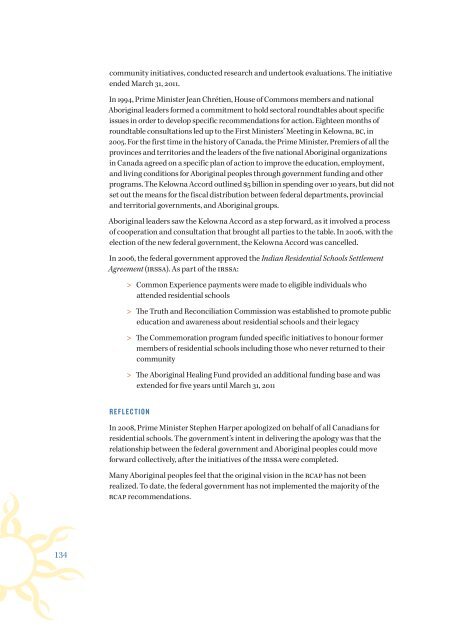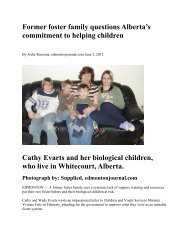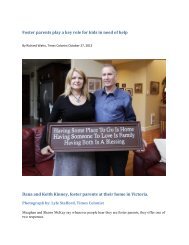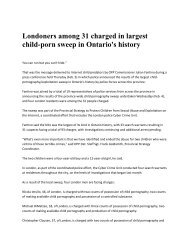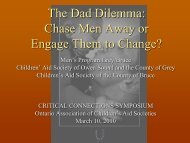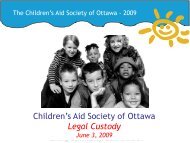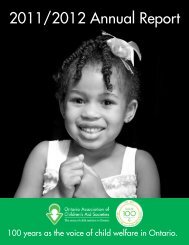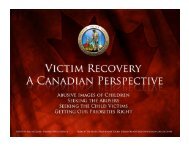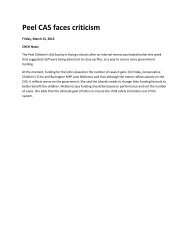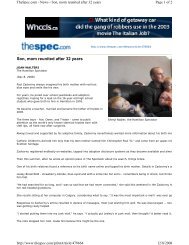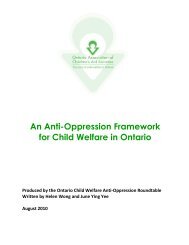English - Ontario Association of Children's Aid Societies
English - Ontario Association of Children's Aid Societies
English - Ontario Association of Children's Aid Societies
Create successful ePaper yourself
Turn your PDF publications into a flip-book with our unique Google optimized e-Paper software.
community initiatives, conducted research and undertook evaluations. The initiative<br />
ended March 31, 2011.<br />
In 1994, Prime Minister Jean Chrétien, House <strong>of</strong> Commons members and national<br />
Aboriginal leaders formed a commitment to hold sectoral roundtables about specific<br />
issues in order to develop specific recommendations for action. Eighteen months <strong>of</strong><br />
roundtable consultations led up to the First Ministers’ Meeting in Kelowna, BC, in<br />
2005. For the first time in the history <strong>of</strong> Canada, the Prime Minister, Premiers <strong>of</strong> all the<br />
provinces and territories and the leaders <strong>of</strong> the five national Aboriginal organizations<br />
in Canada agreed on a specific plan <strong>of</strong> action to improve the education, employment,<br />
and living conditions for Aboriginal peoples through government funding and other<br />
programs. The Kelowna Accord outlined $5 billion in spending over 10 years, but did not<br />
set out the means for the fiscal distribution between federal departments, provincial<br />
and territorial governments, and Aboriginal groups.<br />
Aboriginal leaders saw the Kelowna Accord as a step forward, as it involved a process<br />
<strong>of</strong> cooperation and consultation that brought all parties to the table. In 2006, with the<br />
election <strong>of</strong> the new federal government, the Kelowna Accord was cancelled.<br />
In 2006, the federal government approved the Indian Residential Schools Settlement<br />
Agreement (IRSSA). As part <strong>of</strong> the IRSSA:<br />
> > Common Experience payments were made to eligible individuals who<br />
attended residential schools<br />
> > The Truth and Reconciliation Commission was established to promote public<br />
education and awareness about residential schools and their legacy<br />
> > The Commemoration program funded specific initiatives to honour former<br />
members <strong>of</strong> residential schools including those who never returned to their<br />
community<br />
> > The Aboriginal Healing Fund provided an additional funding base and was<br />
extended for five years until March 31, 2011<br />
REFLECTION<br />
In 2008, Prime Minister Stephen Harper apologized on behalf <strong>of</strong> all Canadians for<br />
residential schools. The government’s intent in delivering the apology was that the<br />
relationship between the federal government and Aboriginal peoples could move<br />
forward collectively, after the initiatives <strong>of</strong> the IRSSA were completed.<br />
Many Aboriginal peoples feel that the original vision in the RCAP has not been<br />
realized. To date, the federal government has not implemented the majority <strong>of</strong> the<br />
RCAP recommendations.<br />
134


